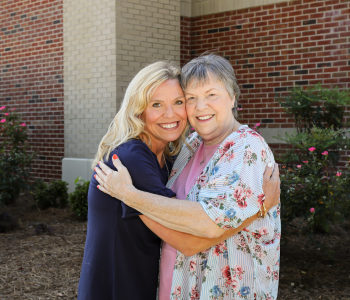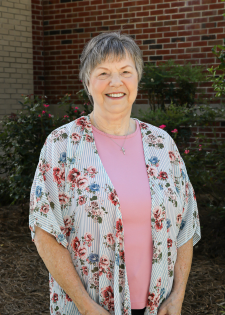After working more than 30 years as the library assistant at the University of West Georgia, Harrell had no idea that her own life would become a story itself — let alone one of determination, hope and victory over breast cancer.
“I worked there from 1967 until 2000,” Harrell said. “When I started, it was called West Georgia College. My favorite part was working with the journals. I loved being with the people there. I developed such good friends
and I had a lot of different jobs there. When I retired, it took more than one person to replace me; they couldn’t find one person who wanted to do all the jobs I did.”

Harrell said her daughter, Vicki, grew up in the library. When school was out for the summer, Vicki would spend her time with Harrell at the library.
“At first I tried to guide her, but it got to the point where she was reading so much and so fast that I just told her to go at it,” Harrell said. “She loved ‘The Bridge to Terabithia’ and read it over and over. When she got to high school, she wanted to do a book report on it and the school librarian said she couldn’t check the book out because she was too young. She called me and was so mad they wouldn’t let her check it out, so I went and checked it out for her from the college library.”
In May 2016, Harrell had her annual mammogram, showing no signs of breast cancer. Just a few months later, Harrell found a lump in her breast.
“I didn’t tell anyone at first because the holiday season was coming,” said Harrell. “I didn’t want to upset both Thanksgiving and Christmas. I ended up telling my daughter right after Thanksgiving because my gynecologist, Dr. Stillwell, wanted me to have tests. I had my mammogram at Tanner in Villa Rica and they sent me straight over to have more tests. It felt like it was the size of a baseball, but it wasn’t that big.”
While they were waiting for Harrell’s results, the Tanner team asked if Harrell had a breast specialist in mind. Her daughter, Vicki, had also seen Raul Zunzunegui, MD. Vicki told the team she was going to reach out to her own doctor, Dr. Zunzunegui, a breast specialist with Comprehensive Breast Care Center.
The team at Tanner said that was exactly who they would recommend.
“I had to wait a while to see him because he was on vacation and during that time my brain just went wild,” Harrell said. “I just kept thinking that I was dying. Dr. Z did a biopsy in his office and confirmed that it was cancer. That’s when we began to talk about a plan and decided that a lumpectomy with chemotherapy and radiation and a hormone blocker would be the best. Things went so fast after I saw him.”
Harrell also had to have her lymph nodes checked to see if the cancer had metastasized to other areas.
“Just to be honest,” Harrell said, “that’s not a fun process. You're lying there and they bring in a box that they handle it with extreme care. They take out these electrodes and needles. They put in about five shots and it hurts like the devil. I told my sister when she had to go through the same process that it was going to hurt. People need to know that so they can be prepared.”
It’s not easy for Harrell to speak about her sister, but she believes that her story needs to be told as well.
“I finished my Herceptin treatment in February 2018 and shortly after that, my sister found a lump in her breast,” Harrell said. “She passed away that August — not from breast cancer, but from the treatments. She was not in good health before the diagnosis and her body couldn’t take it. It took me a long while to get over survivors' guilt. She was my cheerleader during my treatments and I couldn’t do anything for her. I even put everything away like her pictures because it hurt too much to look at them. I had a shirt that said ‘I’m a Survivor’ and I put it away because it hurt so much.”
Knowing that she would lose her hair, Harrell was prepared. She had her granddaughter come to her house to shave her head on the back porch. “She buzzed my hair and I looked down at the hair on the deck and I couldn’t believe it,” Harrell said. “I had naturally brown hair, but I’d been coloring my hair blonde for years. I looked down on the deck and saw blue, brown and blonde hair. I still have no idea where the blue bits came from. It didn’t grow back blue though. We laugh about it now.”
Harrell said sharing her story is important because she doesn’t want others going through what she had to endure. While it took time for her to accept the loss of her sister, she realized that by sharing her own story, she could honor her sister’s memory while also celebrating her own victory.
“All of my treatments were done very quickly and very professionally,” Harrell said. “That was a good thing for me because I didn’t have a chance to worry about anything. My mother had chemo and radiation in 1995, but not for breast cancer. After seeing what she went through, I swore I would never go through it — but never say never. My daughter was with me and told me that I was going to do it and she’d be with me. The chemo was not fun; it was rough.”
Harrell said there were times she would be at the treatment center and cry because she didn’t want to do more chemo.
“The team at the treatment center were so caring,” Harrell said. “They told me that it was going to be OK. The nurses were great; so compassionate. Most of my treatment was at Tanner but I had some at West Georgia Oncology Centers. Those nurses were special as well. I loved all of them. They give you hope. They don’t just say ‘just get through it,’ they give you hope. They told me that it was going to be alright and that they were going to take care of me — and they did.”
For Harrell, radiation was also difficult, but it was not as bad as the chemotherapy.
Harrell’s cancer was first diagnosed as stage 1 cancer, fed by estrogen. It was also HER 2+, which is a more aggressive cancer. After her surgery, the cancer was upgraded to stage 2. Her chemotherapy consisted of three different medications. She was also given hormone blockers for five years.
Harrell has nothing but praise for her doctors and nurses who continue to treat her. Nurse navigator Nicolle Rooks, RN, holds a special place in Harrell’s heart.
“She was wonderful,” Harrell said. “She would talk with me one-on-one and in the support group that she suggested. Sometimes there are a lot of people in the group and sometimes not, but those groups are so important. They have people in all stages of treatment. We meet every month, and she takes her lunch hour to meet with us.” Even now Nicolle holds a special place in Harrell’s heart.
“Those of us who have been through the process help those just beginning. The groups and articles like these are important so women don’t feel alone. We help the ‘newbies’ and let them know how to make it through. They know that they are going to have chemo or radiation, but they don’t understand how that will feel or what will happen. We help them with that. We talk to them and encourage them. I think it helps them. I don’t go so much for myself anymore, but I enjoy being with them to encourage them. We talk about the positive and negative things. Even though we talk about the bad stuff, we try to leave on a positive note with hope and encouragement. The support group is an excellent thing for anyone going through this.”

While men can have breast cancer, the group Harrell attends is exclusively for women.
“Women open up more in a group of other women than they will if a man was there,” Harrell said. “Nicolle keeps it that way and gives women a safe space to talk.”
Harrell is adamant that she could not have made it through the process without her daughter, her sister and her boyfriend.
While both her sister and her boyfriend have passed away, Harrell credits those three as her center and encourages others going through breast cancer to find a support system. She also said it doesn’t have to be family; you can find help in support groups or your doctors or even through a local church.
Her faith was central in her fight and Harrell said that prayer from her church family was “a game changer.”
“My Sunday school class and my choir were so special,” Harrell said. “Statistically, one in every eight women will have breast cancer or will have a close family member with breast cancer.
“I have a large Sunday school class of women and many of them have had it and didn’t say anything. I think that saying something is important. That’s why I’m telling my story.
“If all you hear is the negative part, you’re going to be scared. My journey ended up good, my sister’s didn’t so I’ve seen both parts, but I focus on the good. She was not in good health when she was diagnosed — but until I was diagnosed, I had been in the gym about three times a week. It’s important to stay on top of your health so that if something like this happens, you’re able to fight. It’s also why I’m still involved in the support group. Nobody should fight alone."